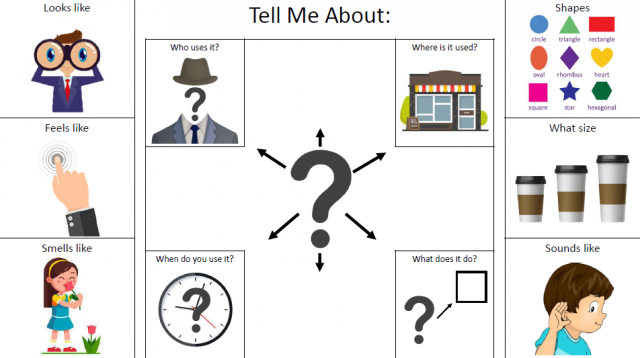Vocabulary refers to the words that we know. In the course of acquiring vocabulary we form concepts in our head, an indispensable foundation of language skills. A robust vocabulary positively influences other areas of communication — listening, speaking, reading and writing. Vocabulary is critical to a child’s success for many reasons:
- range of vocabulary is directly related to school academic achievement
- strong concept formulation teaches children to think and learn about the world
- expanding a child’s knowledge of words provides access to understanding and expressing new information
The most important predictor of vocabulary learning is the number of words that children hear from adults during interactions, conversations, play, and reading books in any language. Children’s vocabulary and concept development is dependent on consistent, nurturing, and interactive learning experiences with adults and peers. The words in our vocabulary are the building blocks for understanding and expressing ideas. As children are exposed to complex language, they begin to use more advanced vocabulary. They also begin to use more sophisticated words to explain their experiences, describe their observations, and make predictions. Vocabulary and concept development are key components for language learning. Developing these skills can pave the way for academic learning in the arts, sciences, technology, mathematics, and languages. (click here to learn more about word types – parts of speech)
Here are some activities that you can do to help vocabulary development:
- use lots of language with children in every interaction
- turn everyday situations into opportunities for discussion and description
- repeat and reward each time a child attempts a word, giving them attention, and affection
- explore and describe the objects, movements and qualities that are around you
- help children to explain their thoughts and feelings with words
- incorporate counting, naming, and describing into everyday activities
- brainstorm members of categories, for example, “Who can think of types of vehicles?”
- what kind of word is that? categorize vocabulary as they come up in interactions (e.g., run, skip, prance are all ways of moving)
- show how it fits: use objects/pictures (to represent words/concepts) and sort words to categories and subcategories
Labeling/Categories activities
Learn vocabulary with Hidden pictures games by Highlight kids
Language Playroom Category activities
Category pictures (with 19 categories)
Identifying categories activity with sentence strips
Let’s name three things in each category activity
Let’s name things that…activity
Seasons and weather sorting activity
Function of objects activity in sentences
Things that do not belong activity
Concepts
Basic concepts are words that children need to understand to perform in everyday tasks. It is important for children to have a good understanding of different concepts as it helps them follow instructions and be specific in what they are talking about. Types of concepts include:
- spatial – inside/outside, in front, behind, around, through, middle, between, either side of
- directional – in/out, up/down
- numerical – numbers (cardinal) such as two, ten
- ordinal – first, second, third, last, next
- shapes – circle, triangle, rectangle, curve, straight, pointy
- measurement – describing items according to size, weight, volume, height, length, speed, temperature
- pattern and structure – patterns on clothes, in pictures, music, speech (rhyming)
- temporal – before/after, while/during, today/yesterday/tomorrow, 10:00am/half past two, days of the week, months of the year
- categorical – types of fruit, clothes, vehicles, animals, plants, actions, shapes, feelings
- comparative – big/bigger/biggest, tall/taller/tallest
- descriptive – describing items according to colour, pattern, texture, size, smell, taste, hardness/density
Encouraging concept development in children is an important step in building knowledge of the arts, mathematics, science, and technology, and other aspects of everyday life. Everyday interactions and planned experiences can be opportunities for learning about different concepts and the words we can use to describe them.
Here are some activities to work on the different types of concepts:
Fall leaves activity to practice a variety of concepts
How to Practice Before & After Concepts
Practice spatial concepts with “where is the toy pig hiding?” photos
Curious George’s busy day game to practice quantity concepts
Oscar the Grouch’s game to practice size and position concepts
‘Compare and Order’ game to practice comparative concepts
Describing
Another way to look at vocabulary is to think about how words relate to other words. Semantics is the study of word meanings and semantic relationships are the ways in which words are related to each other. Semantic knowledge is an important part of children’s language development, that helps them understand and express more complex concepts and ideas. Some examples of types of semantic relationships are categories (e.g., food, emotions, buildings ), antonyms (e.g., hot/cold, fast/slow, big/small), synonyms (e.g., hop/leap/, nice/good/lovely, yummy/tasty/delicious), and part-whole relationships (e.g., bird/wing/beak, apple/core/skin).
- describe a hidden word or picture using details, such as category, size, colour, and parts (e.g., I’m holding a type of food that is small, brown, sweet, and has a hard candy coating)
- point out synonym and antonyms during conversation or book reading
- play word games where you guess the antonym, for example, go/come, do/undo, quietly/loudly
- word finder: encourage children to think deeply and try to come up with other ways of saying something, for example, “How else can we say “big”? What’s another word for ….?”
- word of the day: introduce new words explicitly, discuss their meaning, and model using the word in your language throughout the day
- word maps: explore how words are related to others
- talk it up: incorporate more advanced vocabulary in your interactions with children
Below are some resources and activities to work on describing skills:
Penguin memory describing activity
Tell me about it describing visual

Useful resources and websites
What are basic concepts handout
Teaching basic concepts for early school success
Vocabulary games and resource page from Speech and Language Kids